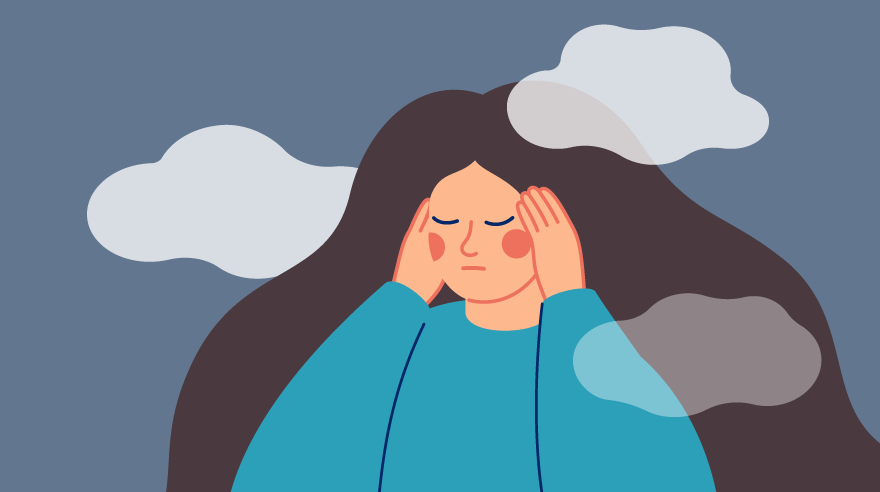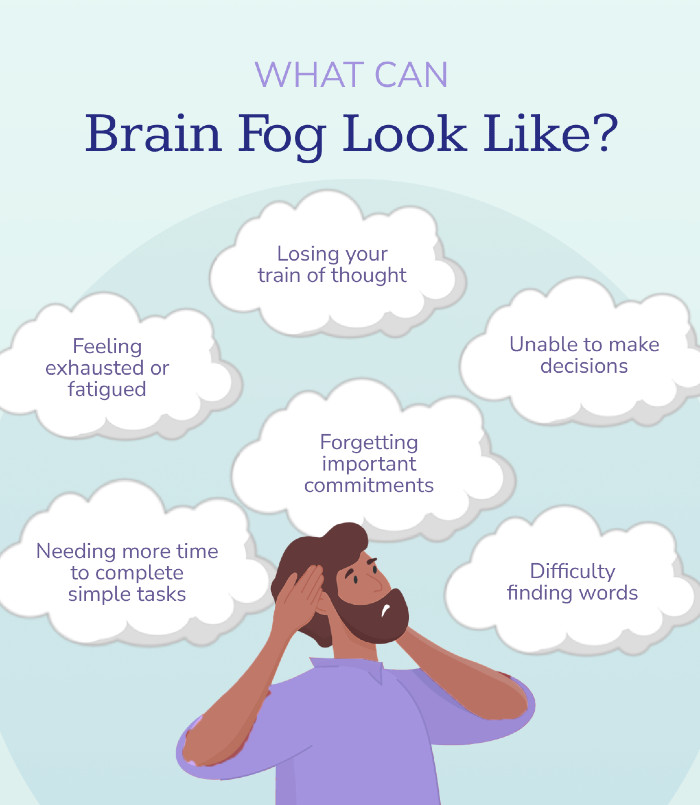Brain Fog & Covid Symptoms
It’s no secret that the Covid-19 pandemic has everyone on edge. In addition to the risk of infection, many people are reporting a variety of symptoms, including brain fog. What is brain fog, and what can you do about it? In this blog post, we will discuss the causes and treatments for brain fog.
What Is Brain Fog?

Brain fog is a symptom of many different conditions, including anxiety, depression, and chronic fatigue syndrome. It can also be a side effect of certain medications. Brain fog causes you to feel mentally exhausted and have difficulty concentrating. You may also have trouble remember things or find it hard to think clearly.
What Causes Brain Fog?
There are many possible causes of brain fog. It can be caused by a lack of sleep, dehydration, or vitamin deficiencies. It can also be a side effect of anxiety, stress, or depression. If you have chronic fatigue syndrome, you may also experience brain fog.
Since the Covid-19 pandemic began, many people have been reporting a variety of symptoms, including brain fog. What is brain fog, and what can you do about it? In this blog post, we will discuss the causes and treatments for brain fog.
Brain Fog Symptoms
Brain fog is a symptom of many different conditions, including anxiety, depression, and chronic fatigue syndrome. This can be described as feeling like you are in a dense fog and having trouble thinking clearly. It can also be a side effect of certain medications. Cognitive issues cause you to feel mentally exhausted and have difficulty concentrating. You may also have trouble remember things or find it hard to think clearly.
What Does Brain Fog Feel Like
This can be described as feeling like you are in a dense fog and having trouble thinking clearly.

There are many possible causes of brain fog. It can be caused by a lack of sleep, dehydration, or vitamin deficiencies. Maybe it can also be a side effect of anxiety, stress, or depression. Learn how stress might be affecting your memory. If you have chronic fatigue syndrome, you may also experience brain fog.
One possible cause of brain fog that has been gaining attention recently is the coronavirus. This virus has been known to cause neurological problems such as encephalitis, which is an inflammation of the brain. In addition to encephalitis the coronavirus can also cause other neurological problems such as meningitis (inflammation of the membranes that surround the brain) and Guillain-Barre Syndrome (a rare condition that causes muscle weakness and paralysis).
The neurological problems caused by the coronavirus can lead to brain fog. On top of these neurological problems, the virus can also cause respiratory problems such as pneumonia, which can also lead to brain fog.
How is Brain Fog Treated?
There is no one-size-fits-all solution for fixing your brain. There are some things you can do to help improve your symptoms. These include:
Getting enough sleep
Drinking plenty of fluids
Eating a healthy diet
Taking vitamins and supplements
Reducing stress
Practicing relaxation techniques
If you are experiencing brain fog, talk to your doctor. They can help you identify the cause of your symptoms and recommend treatment options.
6 Possible Causes
Brain fog may occur due mainly to stress or other factors including medication or other medications. Symptoms of these problems include confusion, memory problems and poor concentration.
There are many potential causes:
- Stress: Stress can lead to a number of symptoms that can interfere with your ability to think clearly and focus on tasks.
- Lack of sleep: Sleep deprivation can cause fatigue, which can make it difficult to concentrate and remember things.
- Dehydration: Dehydration can cause fatigue and make it difficult to focus.
- Vitamin deficiencies: Certain vitamins, such as B12 and D, are essential for cognitive function. A deficiency in these vitamins can cause brain fog.
- Depression: Depression is a common condition that can cause symptoms of fatigue, difficulty concentrating, and memory problems.
- Chronic fatigue syndrome: Chronic fatigue syndrome is a condition characterized by extreme fatigue that can interfere with your ability to think clearly and perform everyday tasks.
If you’re experiencing brain fog, talk to your doctor or find a a doctor here. They can help you identify the cause of your symptoms and recommend treatment options.
How to Detect Brain Fog
Detecting Brain Fog can be tricky but to see if your brain is not performing well we recommend you try MemTrax. By watching your brain test scores your may be able to spot an obvious change in your cognitive function. Sign up today and see how you do over a month, you will have fun looking at the pictures and enjoy a healthy new habit.
What are Some Symptoms of COVID-19?
Keep an eye on your symptoms. You should also check for fevers and coughs as a possible complication.

The most common symptoms of COVID-19 include:
- Shortness of breath or difficulty breathing
- Muscle or body aches
- Fever
- Cough
- Sore throat
- New loss of taste or smell
- Fatigue
- Muscle or body aches
- Headache
- New loss of taste or smell
These symptoms may appear two to fourteen days after exposure.
How long does it take to get symptoms once you contract COVID-19?
Symptoms typically begin in two days after an infection. Incubation times vary between individuals and this can be dependent on variants. While there are no symptoms during the incubation period, corona viruses still can be transmitted through the incubation to others.
What are some tips to avoid getting sick?
There is no guaranteed way to prevent illness, but there are some steps you can take to reduce your risk of exposure to the virus. These include:
- Washing your hands often with soap and water for at least 20 seconds
- Avoiding close contact with people who are sick
- Wearing a face mask in public settings
- Staying home as much as possible
- Disinfect hi-touch surfaces
- Avoiding crowded places
- Practicing social distancing by keeping at least six feet between yourself and others.
Brain health abnormalities may be a symptom of several different conditions. It can cause you to feel mentally exhausted, have difficulty concentrating, and have trouble remember things. There are many possible causes of brain fog, including stress, lack of sleep, dehydration, vitamin deficiencies, depression, and chronic fatigue syndrome.
I hope this blog post has helped you understand more about brain fog and how you can treat it. If you think you may have a medical emergency, call 911 immediately. For all other concerns, please consult your healthcare provider. The information in this blog post is not intended to diagnose, treat, or cure any disease or condition.
In conclusion, the cause of cognitive impairment may differ depending on the individual, there are some general tips that can help reduce your risk of exposure to the virus. These include washing your hands often, avoiding close contact with people who are sick, wearing a face mask in public settings, and staying home as much as possible. Be sure to disinfect surfaces that are frequently touched while also avoiding crowded places. Need more tips for staying healthy on the go – READ ON!
